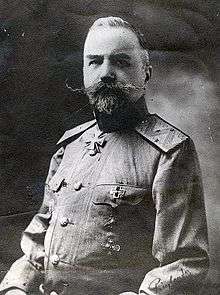Yevgeny Miller
| Yevgeny Miller | |
|---|---|
 General Yevgeny Miller | |
| Birth name | Yevgeny-Ludvig Karlovich Miller |
| Born |
25 September 1867 Dünaburg, Vitebsk Governorate, Russian Empire |
| Died |
11 May 1939 (aged 71) Moscow, Soviet Russia |
| Allegiance |
|
| Service/branch |
Imperial Russian Army White Army |
| Years of service | 1884–1920 |
| Rank | Lieutenant-General |
| Battles/wars |
World War I Russian Civil War |
Yevgeny-Ludvig Karlovich Miller[1] (Russian: Евгений Карлович Миллер; 25 September 1867 – 11 May 1939) was a Russian general and one of the leaders of the anticommunist White Army during and after the Russian Civil War.
Early life
Miller was a career officer born to a Baltic German noble family in Dünaburg (now Daugavpils, Latvia).[2] After he graduated from the General Staff Academy, he served with the Russian Imperial Guard. Between 1898 and 1907, he was a Russian military attaché in several European capitals, such as Rome, The Hague and Brussels. During the First World War, he headed the Moscow military district and the 5th Russian Army and was promoted to the rank of lieutenant general.
Civil War
After the February Revolution of 1917, Miller opposed "democratization" of the Russian army and was arrested by his own soldiers after he ordered them to remove red armbands.
After the October Revolution of 1917, Miller fled to Archangelsk and declared himself Governor-General of Northern Russia. In May 1919, Admiral Kolchak appointed him to be in charge of the White Army in the region. In Archangelsk, Murmansk and Olonets, his anti-Bolshevik army was supported by the Triple Entente, mostly British forces. However, after an unsuccessful advance against the Red Army along the Northern Dvina in the summer of 1919, British forces withdrew from the region, and Miller's men faced the enemy alone.
Exile

In February 1920, General Miller with 800 refugees sailed from Archangelsk to Tromsø, Norway. Later, he moved to France and, together with Grand Duke Nicholas and Pyotr Nikolayevich Wrangel, continued his anticommunist activism. Between 1930 and 1937, Miller served as a chairman of the Russian All-Military Union.
Kidnapping
On 22 September 1937, NKVD informer and All-Military Union intelligence chief Nikolai Skoblin led Miller to a Paris safe house, ostensibly to meet with two German Abwehr agents, who were in fact officers of the Soviet NKVD disguised as Germans. They drugged Miller, placed him in a steamer trunk and smuggled him aboard a Soviet ship in Le Havre. However, Miller had left behind a note to be opened if he failed to return from the meeting. In it, he detailed his suspicions about Skoblin.
French police launched a massive manhunt, but Skoblin fled to the Soviet embassy in Paris and eventually was smuggled to Barcelona, where the Second Spanish Republic refused to extradite him to France.[3]
However, the French authorities arrested Skoblin's wife, Nadezhda Plevitskaya, and a French court convicted her and sentenced her to 20 years in prison.[3][4]
The NKVD successfully smuggled Miller back to Moscow, where he was tortured and summarily shot nineteen months later on 11 May 1939. According to NKVD General Pavel Sudoplatov, "His kidnapping was a cause celebre. Eliminating him disrupted his organization of Tsarist officers and effectively prevented them from collaborating with the Germans against us."[5]
Copies of letters written by Miller while imprisoned in Moscow are in the Dmitri Volkogonov papers at the Library of Congress.
In popular culture
The kidnapping was the subject of a book written by Anatoly Rybakov, The Fear. It was also the basis of the French film Triple Agent (2004), directed by Éric Rohmer.
General Miller appears as General Fedchenko in Vladimir Nabokov's story "The Assistant Producer", in which he is betrayed by "General Golubkov".
In addition, the kidnapping of General Miller is also fictionalized in Nikita Mikhalkov's award-winning film Burnt by the Sun. In the film the character known as "Mitya" (Oleg Menshikov) is a former White Army officer turned NKVD agent. Posing as a pianist in Paris, Mitya is described as having delivered eight White Generals to the NKVD. All are described as having been kidnapped, returned to Moscow, and shot without trial. One of the Generals is given the name "Weiner".
See also
- White movement
- North Russia Intervention
- Russian All-Military Union
- Mikhail Kvetsinsky, Miller's chief of staff
Notes
- ↑ A. Tarulis, American-Baltic relations, 1918-1922: the struggle over recognition, Catholic University of America Press, 1965, p. 190
- ↑ V. Goldin, J. Long, Resistance and Retribution: The Life and Fate of General EK Miller. Revolutionary Russia, 1999.
- 1 2 Barmine, Alexander, One Who Survived, New York: G.P. Putnam (1945), pp. 232–233
- ↑ Orlov, Alexander, The March of Time, St. Ermin's Press (2004), ISBN 1-903608-05-8
- ↑ Pavel Sudoplatov, Special Tasks: The Memoirs of an Unwanted Witness, a Soviet Spymaster, 1994. page 37.
References
- Barmine, Alexander, One Who Survived, New York: G.P. Putnam's Sons (1945)
- Orlov, Alexander, The March of Time, St. Ermin's Press (2004), ISBN 1-903608-05-8
- Quinlivian, Peter (2006). Forgotten Valour: The Story of Arthur Sullivan VC. Sydney: New Holland. ISBN 978-1-74110-486-8.